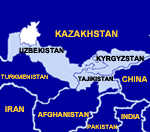
Algeria
Central Africa
Sierra Leone
Zimbabwe
Asia
Burma/Myanmar
Cambodia
Central Asia
Indonesia
Balkans
Albania
Bosnia
Kosovo
Macedonia
Montenegro
Serbia
Issues
EU
HIV/AIDS
Terrorism
Latin America
Colombia
 
|
||||||
Project Overview
After a decade of independence following the collapse of the Soviet Union, the nations of Central Asia are finding themselves increasingly at risk of conflict and internal strife. Authoritarian governments that have failed to meet the economic and political aspirations of their people are increasingly reliant on repression to remain in power. Rather than joining together, the nations of Central Asia have cut themselves off from one another, instituting tougher border controls and visa regimes in an area where people once moved freely. Tensions over borders, trade and such resources as water and gas are on the rise while the conflict in Afghanistan, drug trafficking and Islamist extremism are sources of concern in the region and beyond. Uzbekistan has found itself trapped in a vicious cycle of repression and instability as the government of President Islam Karimov grows increasingly anxious about incursions by the Islamic Movement of Uzbekistan (IMU). This group, now based in Afghanistan, has raised tensions across the region but these have been exacerbated by the response of the government of Uzbekistan which has stepped up repressive measures, driving moderate Moslems and opposition figures into the arms of extremists. Uzbekistan has remained outside the mainstream of reform, choosing to run an almost closed economy and an authoritarian political system. Kyrgyzstan, once hailed as an �island of democracy� in Central Asia, has also seen a drift away from reforms. President Askar Akaev has raised tensions by acting against opposition figures and the media. Incursions by the IMU in the south of the country have caused problems with Uzbekistan and heightened ethnic tensions. A border deal with China has become a political scandal and a faltering economy has failed to live up to expectations as corruption becomes the norm. Tajikistan is still trying to recover from its brutal civil war but there are concerns over whether its peace agreement will hold. Fears about Islamist extremism in neighbouring countries have raised cross border tensions and Tajikistan remains caught in the shadow of the conflict in Afghanistan. Since 2000, ICG has an office with five staff in the Kyrgyzstani city of Osh at the western end of the Ferghana Valley, a relatively densely populated region of 10 million people that is a particular area of concern regarding cross-border conflict and ethnic tensions. Research has focused on the potential causes of conflicts including the internal political dynamics of these countries, Islamist militancy, drugs, the environment, and border demarcations. The project is also looking at religious and ethnic issues across the region.
|

| Afghanistan and Central Asia: Priorities for Reconstruction and Development Report 27 November 2001 |
|
| Central Asia: Drugs and Conflict Report 26 November 2001 |
|
| Central Asian Perspectives on 11 September and the Afghan Crisis Briefing 28 September 2001 |
|
| Le 11 septembre et la crise afghane vus de l'asie centrale Briefing 28 September 2001 |
|
| Kyrgyzstan at Ten: Trouble in the "Island of Democracy" Report 28 August 2001 |
|
